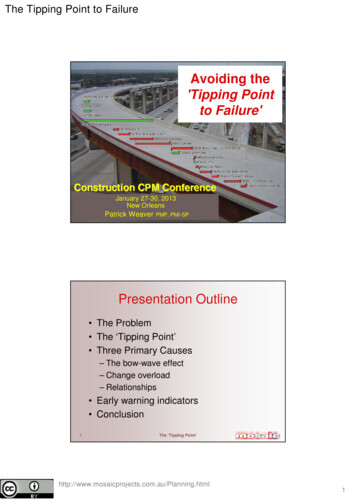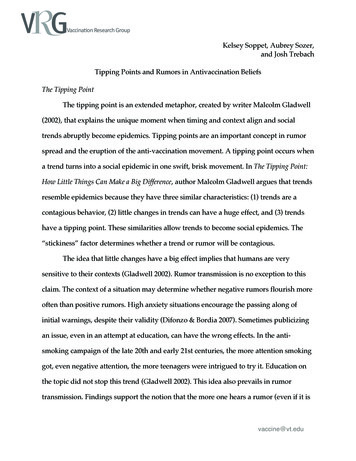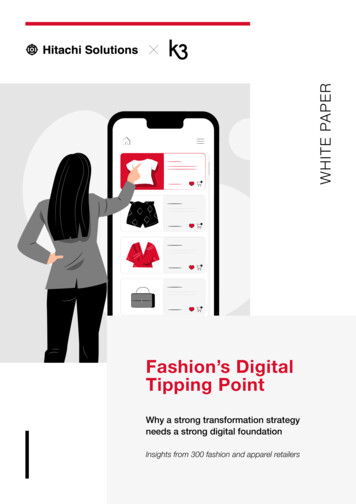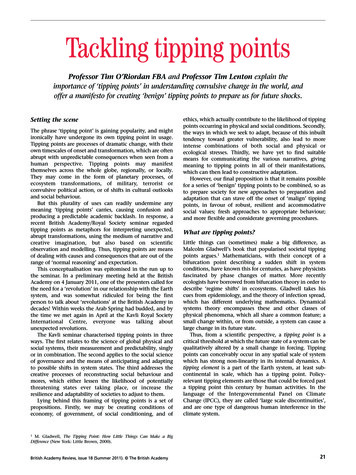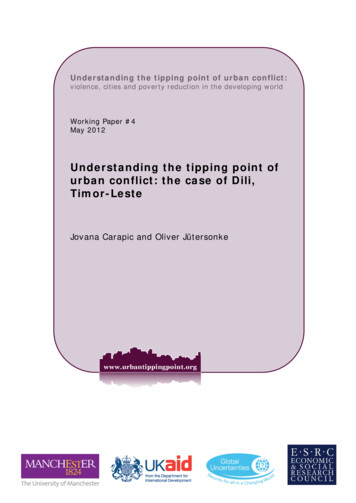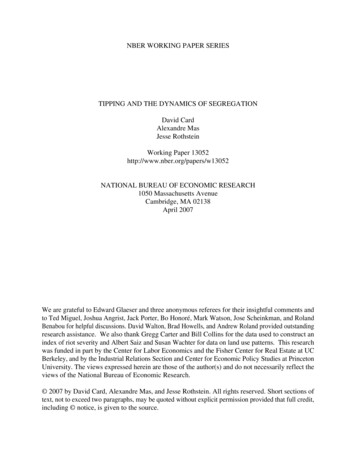
Transcription
ESG: BEYONDTHE TIPPING POINTHosted by
ContentsESG: Beyond the tipping pointCONTENTSPage 3ForewordPage 4IntroductionPage 7InfographicHow businesses are beginningto embrace sustainabilityPage 8Page 13Page 19Page 262.3.4.ESG takes center stageFrom challenge to opportunity:ESG paybackPurpose matters to your peoplePage 32ConclusionPage 33AcknowledgmentsPage 34Research demographics2
ForewordESG: Beyond the tipping pointA message from Masdar’s CEOAs the title of this report makes clear, today weare at a tipping point when it comes to executiveattitudes towards Environment, Social andGovernance (ESG) reporting.Once the preserve of niche or specialist companiesoperating in recognizably green or ethical fields,ESG is now mainstream. And, fed by investorpressure and the popularity of purpose-led businessstrategies, ESG has reached enough of a criticalmass that it seems very unlikely that we will be ableto retreat to the old profits-above-all models of thepast, even if we wanted to.As this survey reveals, 87 percent of our respondentssay that improving ESG performance is now one oftheir organization’s core strategic objectives.This new focus on ESG is not without its challenges,however. As our survey also shows, one in fiveexecutives are worried about how they can build abusiness case for investing in ESG, while almost 80percent say they need to get better at reporting onthe effectiveness of their investments in ESG and thereturns they are generating.For those 20 percent who really are struggling tomake the case for ESG, I would like to reassure themthat the tipping point isn’t where we are in termsof the pressure on companies to incorporate ESGreporting; it’s the point at which ESG will deliver realreturns for companies and their investors.As we look to a new business landscape after thepandemic, that point is now. The opportunitiespresented by the Green Recovery will further fuelinvestor appetite for backing smart, sustainablecompanies. Those companies that ignore ESG, orsimply pay it lip service, will lose their relevance in thepost-COVID era. Those that integrate ESG properlyinto their strategies and daily processes will define anew, better, and more sustainable era of business.Mohamed Jameel Al RamahiChief Executive Officer, MasdarI am pleased to say that things are very differentat Masdar: when we were founded 15 years ago,ESG was baked into our DNA. Our mandate was toseek quality investments in renewable energy andsustainable technologies. We invested in sectorsthat were still in their early stages at the time,taking an early-mover risk both with regards totechnologies and also in terms of regulatory supportschemes and competitive business models. Ourpioneering journey was not easy but Masdar hasstayed the course to deliver tangible results.3
IntroductionESG: Beyond the tipping pointINTRODUCTION“The pandemic has presentedsuch an existential crisis –such a stark reminder of ourfragility – that it has driven usto confront the global threat ofclimate change more forcefullyand to consider how, like thepandemic, it will alter our lives.It has reminded us how thebiggest crises, whether medicalor environmental, demand aglobal and ambitious response.BlackRock CEO Larry Fink in his 2021letter to CEOs„For many consumers, employees, suppliers,investors and policymakers, Fink’s “ambitiousresponse” means forcing sustainability to the top ofthe agenda.In this report, we examine the results of a globalsurvey of 525 executives to find out how businessesaround the world are responding.The survey results show that executives are awarethey need to engage with Environmental, Socialand Governance (ESG) issues, and they see thepandemic as a tipping point for investing insustainability. Many have a personal commitmentto managing businesses responsibly, which sitsalongside a growing recognition of both thecommercial and non-financial advantages ofimproved ESG performance. And ESG is set tobecome a competitive field as companies competefor the best talent, with growing numbers ofindividuals – including executives – now wanting towork for businesses that meet the highest standards.4
ESG: Beyond the tipping pointIntroductionMany businesses are also conscious of theirconstraints, and are focusing on how to overcomethose obstacles. They are concerned aboutshortfalls in reporting, for instance, which make itmore difficult to assess the return on investment.Many also feel they need to recruit new talent withspecialist skills.But businesses are determined to confront thesechallenges. It is clear that the momentum for ESGand sustainability is simply too powerful to ignore.THE KEY DATA AT A GLANCE87%of respondents say that improvingESG performance is now one of theirorganization’s core strategic objectives.85% see the COVID-19 pandemic as awake-up call on sustainability.79% of respondents believe they needto improve their reporting on ESG returnson investment.72% would be more likely to applyfor a job at a company with strong ESGcredentials, and 52 percent would take apay cut to move to such a company.65% of businesses expect to realizefinancial benefits from ESG investmentwithin the next two years.63% say that ESG has become moreof a priority for their business since theoutbreak of the pandemic.49% are prioritizing ESG partlybecause investors have become moredemanding on the issue.5
IntroductionESG: Beyond the tipping pointIn addition to the survey, we conducted in-depthinterviews with the following experts to learn moreabout what their organizations are doing to drivelong-term sustainability:David CroftsExecutive director,enterprise riskmanagement, MubadalaInvestment CompanyJosh GiegelCo-founder and CEO,Virgin HyperloopPeter HarrisVice presidentfor internationalsustainability, UPSRebecca MarmotChief sustainabilityofficer, UnileverDerek RozyckiHead of responsibleinvesting, MubadalaInvestment CompanyGayle SchuellerVice president and chiefsustainability officer, 3MDietmar SiersdorferManaging directorMiddle East & UAE,Siemens Energy6
InfographicESG: Beyond the tipping pointBUSINESSES ARE PRIORITIZINGESG AND SUSTAINABILITYESG87%50%85%63%say that improving ESGperformance is now amongtheir core strategic objectivessay they are activelyinvolved in helping theirorganizations to achievenet-zero emissions targetssay that the COVID-19pandemic has been asustainability wake-up callsay that ESG principles orESG strategies havebecome more of a priorityfor their business since theoutbreak of the pandemicAND THEY EXPECT ITTO PAY OFF – FASTWhen does your company expect the financial benefitsfrom investing in ESG principles to materialize?8%5 years19%3-5 years65%expect to see financial benefitsfrom ESG investment withinthe next two years30%1-2 years35%12 monthsNeverDon’t know N/A4%3%7
ESG: Beyond the tipping point1. How businesses are beginning to embrace sustainability1.HOW BUSINESSESARE BEGINNINGTO EMBRACESUSTAINABILITY8
ESG: Beyond the tipping point1. How businesses are beginning to embrace sustainability9
1. How businesses are beginning to embrace sustainabilityESG: Beyond the tipping pointBusinesses worldwide are embracing ESG goals:87 percent of respondents in our research say thatimproving ESG performance is now one of theirorganization’s core strategic objectives.Nine in 10 companies say ESG issuesare a core strategic objective87%trueDerek Rozycki, head of responsible investing atUAE-based Mubadala Investment Company, saysthe sovereign wealth fund is in the process ofincreasing its understanding of the carbon footprintit has across its portfolio. “That’s a core goal for usin the foreseeable future,” he says. “And then indue course making decisions about how best totransition that in an appropriate way again, with theconcept of improving our profile over time.”13%not trueExecutives in Asia-Pacific are morecommitted to helping their organizationsachieve net-zero ambitions than those inother regionsAPAC70%North America55%Improving our ESG performance is one of ourcore strategic objectivesEurope42%Half of respondents say that their company is nowcommitted to achieving net-zero emissions targetsand that they personally are playing an active rolein achieving this goal. Significantly more C-suiteexecutives say this (63 percent) than those in generalroles (39 percent).The picture is also mixed in terms of regions.For example, while 70 percent of Asia-Pacificrespondents say they are playing their part onclimate change at a corporate level, only 33 percentof their counterparts in the Middle East & Africa do.But the pace of developments in the Middle Eastis likely to pick up: governments are encouragingstate-owned entities to lead the charge in theregion under initiatives such as the UN’s SustainableDevelopment Goals, and as investors in the OnePlanet Sovereign Wealth Funds framework.Middle East & Africa33%Average50%My company is committed to achieving net-zero emissionstargets and I am actively involved in the process(Percentage of respondents who agree)Unilever is one company that has been on atransformative journey over the past decade tobecome sustainable and integrate profit withpurpose. It understands that businesses that setclear targets and involve their leaders in achievingthem will be repaid by consumers.10
1. How businesses are beginning to embrace sustainabilityESG: Beyond the tipping point“We see all the time from our consumer research thatconsumers want to buy products from companiesthat reflect their values – purposeful brands thatreally put the sustainability message at the core ofthe consumer proposition,” says Rebecca Marmot,chief sustainability officer at Unilever. “We know thatpurpose really does drive brand power, and brandpower does drive growth.”That is a powerful motivating factor for companiesto make a difference. And 73 percent ofrespondents say that for the first time in their careersthey believe there is enough positive momentum inbusiness and finance to make a material contributionto tackling climate change.The majority of respondents agree thatwe are at a tipping point in fightingclimate changeNorth America82%APAC76%Middle East & Africa70%Dietmar Siersdorfer, Middle East and UAE managingdirector at Siemens Energy, believes that companiesneed a credible sustainability narrative. “If youdo not have sustainability as a core part of yourstrategy, you are not credible in society, becausethe global community has identified that we needto become more sustainable,” he says. “If we, asa company, do not follow through and becomeleaders in that, we are not equipped for the futureand we will not survive.”ESG MAKES COMMERCIAL SENSESurvey respondents agree on the need for thecorporate world to tackle climate change andhelp build an equitable society, but companiesalso have to remain competitive and profitable.Nearly six in 10 (58 percent) warn that having tobalance customer demands for sustainability withshareholder profit expectations is holding backprogress on both fronts. For some companies,however, this is a more natural fit.“In our case, it is about how we apply science toaddress the world’s biggest challenges,” says GayleSchueller, vice president and chief sustainabilityofficer at diversified manufacturing and technologycompany 3M. “Our customers expect that fromus, our employees certainly expect it of us, andinvestors and other stakeholders are also askingfor more in this space. It anchors purpose-driveninnovation in our products.”Europe64%Average73%For the first time in my career, I believe there is enoughpositive momentum in business/finance to make a materialcontribution to tackling climate change(Percentage of respondents who agree)11
1. How businesses are beginning to embrace sustainabilityESG: Beyond the tipping pointBalancing profit with sustainability is easier for some sectors than for others68% Technology56%Industrials/manufacturing58% Energy38% Transport57% Financial services58%56% Consumer goodsAverageBalancing customer demands for sustainability with shareholder profit expectations is holding back progress on both fronts(Percentage of respondents who agree)Sustainability and profitability are not competingpriorities, according to Peter Harris, vice presidentfor international sustainability at global logisticsprovider UPS. “Rather, they are increasingly likely togo hand in hand,” he says. “If you look at the riskswe face as an organization and the opportunitiesthat we have, it is commercial common sense for usto strongly pursue ESG, or sustainability.”Investors will be aware of the potential disruptionfrom the energy transition and social justicemovements. Business leaders who worry todayabout shareholders’ expectations may soon facedifficult questions about ESG failures.“We have seen the conversation shift significantly,and the focus is no longer purely on shareholdervalue, but also the broader stakeholder value,”says David Crofts, executive director, enterprise riskmanagement at Mubadala Investment Company.“We are seeing an increased interest from manyof the organizations we work and engage with,including the World Economic Forum. They arelooking to long-term, institutional investors,including funds like Mubadala, to have a robustapproach to understanding and managing themost material ESG topics as we deploy capital andmanage our investments.”12
ESG: Beyond the tipping point2. ESG takes center stage2.ESG TAKESCENTER STAGE13
ESG: Beyond the tipping point2. ESG takes center stage14
2. ESG takes center stageESG: Beyond the tipping pointThe COVID-19 pandemic has reminded businesses ofsociety’s fragility and their exposure to its disruption –particularly in an interconnected global marketplace.In our research, 85 percent of respondents say thatthe crisis is a wake-up call for business leaders: it hasshown that they need to make big changes to theiroperating models and ensure long-term sustainability.Higher ESG ratings require better supply chainmanagement and governance of employee practices.The organizations that perform less well in theseareas have been more exposed to the crisis.The pandemic is giving businesses a new perspective on ESG and resiliencestrongly disagree2%2%somewhat disagree11%strongly agree42%neutral43% somewhat agreeThe pandemic is the wake-up call that business leaders need to make large changesto their operating models and ensure long-term sustainability15
2. ESG takes center stageESG: Beyond the tipping pointMore than six in 10 respondents (63 percent) saythat ESG principles or strategies have become moreof a priority for their business since the outbreak ofthe pandemic. Only 18 percent of respondents inEurope say ESG principles have become much moreof a priority, possibly due to a high existing standard.However, other regions are keen to catch up.ESG has risen in importance less dramaticallyin Europe than elsewhereMuch more of a priorityA little more of a priorityAPAC40%34%Middle East & Africa40%24%Different sectors have also reacted differentlyto the pandemic. In the logistics sector, forexample, companies experienced new risks,such as transportation bottlenecks, as well asnew opportunities from the massive spike ine-commerce. For some firms, it has led to a newfocus on sustainability.This learning process is feeding into businesses’increased emphasis on ESG: 54 percent ofbusinesses say that during the crisis theydiscovered that improving social and governancestandards enabled them to make more of adifference than they had previously realized. That isparticularly true in the Asia-Pacific region, where 74percent saw a larger than expected impact of theirhigher social and governance standards – muchhigher than elsewhere.“We need companies to be doing their part toimpact sustainability, addressing the environmentaland social challenges of our lifetimes,” says GayleSchueller, vice president and chief sustainabilityofficer at 3M. “We expect countries to do that andwe expect individuals and NGOs to do that, butcompanies have a unique ability to do that – boththrough their products and their own footprints.”North America27%32%Europe18%35%Average32%31%Since the outbreak of the pandemic, would you say thatESG principles or ESG strategies have become more or lessof a priority for your business?(Percentage of respondents who agree)16
2. ESG takes center stageESG: Beyond the tipping pointMany companies were surprised bythe immediate impact of improvingESG standards54%49%47%We realized that we couldmake a more immediatedifference than we thoughtby improving social andgovernance standards, and arebuilding on the momentumWe expect ESG to become abigger consideration forinvestors in the wake of thepandemic, and we need tomeet inclusion criteriaSince the pandemic startedour customers have beenmore interested in ESG, andwe are responding to demandINVESTORS SHIFT TO ASTRONGER POSITIONDespite the shift of accountability to a broaderstakeholder group, shareholders are a driving forcefor ESG across sectors and regions. Nearly half ofall respondents (49 percent) say they are prioritizingESG because it is important to investors.This reflects the fact that investors are now seekingout businesses with solid ESG credentials; 78percent of respondents say that their own fundmanagers are more likely to invest in assets thatemphasize ESG factors now, compared with 12months ago.Fund managers are pivoting toward ESGNorth America84%47%We are taking steps toimprove our resilience, andESG performance is a criticalpart of thisMiddle East & Africa80%APAC41%Since the pandemic startedthere has been morepressure from employeesfor sustainability80%Europe68%33%We have seen financialbenefits from our existingESG strategiesYou said that ESG has become more of a priority for yourbusiness since the outbreak of the pandemic. Why is that?Average78%Our fund manager(s) is/are more likely to invest in assets thatemphasize ESG factors than they were 12 months ago(Percentage of respondents who agree)17
2. ESG takes center stageESG: Beyond the tipping pointEnergy company fund managers are keen to have ESG exposure90% Energy71% Transport82%Industrials/manufacturing67% Consumer goods81% Technology78%75% Financial servicesAverageOur fund manager(s) is/are more likely to invest in assets that emphasize ESG factors than they were 12 months ago(Percentage of respondents who agree)So even if businesses themselves do not see thepandemic as an ESG tipping point, they do acceptthat investors feel this way.The pandemic might have been a wake-up call formany, but the foundations of ESG have long been inthe making, and some businesses will find the pivoteasier than others.Derek Rozycki, head of responsible investing atMubadala Investment Company, says the sovereignwealth fund has always incorporated considerationof ESG metrics into its transactions on a deal-by-dealbasis. “But now, there is a growing body of evidencethat shows that by focusing on the right aspects ofresponsible investment and ESG initiatives you cansignificantly accelerate returns and value creationover time,” he says.18
ESG: Beyond the tipping point3. From challenge to opportunity: ESG payback3.FROM CHALLENGETO OPPORTUNITY:ESG PAYBACK19
3. From challenge to opportunity: ESG paybackESG: Beyond the tipping point“When you innovate, you find that the risks startto turn themselves into opportunities,” says PeterHarris, vice president for international sustainabilityat UPS. “You can enhance the brand, connectwith customers who are looking for future-mindedsolution providers, connect with investors andconnect with employees. All those opportunities payyou back commercially.”Like UPS, many businesses are looking forward to arange of benefits from investment in sustainability.“The way you can get out of hopeless inevitability isby doing, building and creating,” says Josh Giegel,co-founder and CEO at Virgin Hyperloop, whichis developing high-speed transport technologyoffering zero-direct-emissions travel.“With the hyperloop, we want to enable a 21stcentury lifestyle with 21st-century responsibilitiesfor protecting the environment with 21st-centurytechnology,” he adds. “That really resonates with alot of people.”COMPANIES PREDICTRAPID RESULTSMany businesses anticipate that the pay-offs fromstrengthening ESG aspects in their organization,or in the case of financial services companiesincorporating ESG data into their decision-making,will accrue quickly. In our research, 65 percent ofrespondents expect to realize the financial benefitsof ESG investment within the next two years,including 35 percent who expect it within the next12 months.ESG benefits are expected sooner ratherthan laterIn more than 5 years8%In 3–5 years19%In 1–2 years30%Within 12 months35%Not expecting any financial benefits4%Don't know/not applicable3%When does your company expect the financial benefits frominvesting in ESG principles to materialize?20
ESG: Beyond the tipping pointThey have good reason to expect to win big.In his 2021 letter to CEOs, Larry Fink says that“companies with better ESG profiles are performingbetter than their peers,” and are enjoying a“sustainability premium.”“During 2020, 81 percent of a globallyrepresentative selection of sustainable indexesoutperformed their parent benchmarks,” says Fink.“This outperformance was even more pronouncedduring the first-quarter downturn, another instanceof sustainable funds’ resilience that we have seen inprior downturns.”But in addition to financial gains, many businessesare also seeing non-financial benefits: 26 percentof respondents to our research say they areexperiencing enhanced operational efficiency,and 21 percent say they have benefitted from animproved public image and better media coverage.3. From challenge to opportunity: ESG paybackIncreased emphasis on sustainability/ESG hasled to wide-ranging non-financial benefitsEnhanced operational efficiency26%Greater efficiency and cost-control26%More favorable public image/media coverage21%Improved customer retention20%New client base19%Which of the following outcomes, if any, has your organizationachieved as a by-product of its efforts to become moresustainable or embed ESG in its portfolio? (Top 5)21
3. From challenge to opportunity: ESG paybackESG: Beyond the tipping pointSome sectors are doing even better. About athird of consumer goods companies (34 percent)say that ESG investment has enhanced theiroperational efficiency; 40 percent of respondentsfrom industrial companies say their cost-controlis in better shape; and 35 percent of respondentsin the financial services sector say it has improvedcustomer retention.Gains vary by sectorConsumer 21%16%18%25%EnhancedoperationalefficiencyGreater efficiencyand cost-controlMore favorablepublic image/mediacoverageImprovedcustomerretentionNew client baseWhich of the following outcomes, if any, has your organization achieved as a by-product of its efforts to become moresustainable or embed ESG in its portfolio? (Top 5)22
3. From challenge to opportunity: ESG paybackESG: Beyond the tipping pointSustainability opens up a new client base for companies in the Middle East & AfricaAPACEuropeMiddle East & AfricaNorth ter efficiencyand cost-controlMore favorablepublic image/mediacoverageImprovedcustomerretentionNew client baseWhich of the following outcomes, if any, has your organization achieved as a by-product of its efforts to become moresustainable or embed ESG in its portfolio? (Top 5)23
3. From challenge to opportunity: ESG paybackESG: Beyond the tipping pointSOME CHALLENGES LINGERIf the benefits are so clear cut, what is holding somebusinesses back?In the research, the biggest problem is sustainablesourcing: 24 percent of respondents worry abouthow to invest in sustainability while maintaining lowprices for natural resources; in Asia-Pacific, the figurerises to 29 percent.Unilever is working with the likes of WWF to createa level playing field for responsibly sourcing naturalresources such as palm oil. “When Unilever wassetting up sustainable sourcing for palm oil, werealized that if we brought others on board and didit at an industry level in a pre-competitive way, thereis an opportunity to create a sustainable supplychain at scale,” says Rebecca Marmot, the firm’schief sustainability officer.Even sustainability’s first movers need to work tokeep up, says Siemens Energy’s managing directorfor the Middle East and UAE, Dietmar Siersdorfer.Siemens Energy has committed to becoming acarbon-neutral company by 2030 and to switchingto electricity from renewable energy by 2023.“But everyone starts at a different point, andeveryone is at a different stage in the journey,” hesays. “Companies will move at different speeds indifferent sectors – as well as in the different regionsin which they operate.“We are always striving to reduce greenhouse gaseseverywhere, but the question is where to start,” headds. “Iraq, for example, has a high need for energy,but installing solar and more wind farms will notsolve the problem. They first need to use existingtechnology because they already have the relevantequipment, and then migrate over to renewablesover time.”Pressure to pay low prices for natural resources to remain competitive undermineslong-term sustainability and environmental goalsMarket pressure to maintain low costs for natural resources24%Uncertain business landscape due to pandemic22%Establishing a business case for enhancing sustainability20%Market pressure to maintain low costs for labor19%Poor-quality environmental data and reporting18%What are the biggest challenges your organization faces in its efforts to become more sustainable or embed ESGin its portfolio? (Top 5)24
3. From challenge to opportunity: ESG paybackESG: Beyond the tipping pointREPORTING BECOMES ESSENTIALMany businesses may not yet generate gooddata on their return on ESG investment, whichcreates problems for budgeting and the businesscase. In our research, 79 percent of businessessay they need to get better at reporting on theeffectiveness of their investments in ESG and thereturns they are generating.BlackRock also urges standardization. “Weappreciate that disclosure can be cumbersome andthat the variety of reporting frameworks createsfurther complexity for companies,” says Larry Finkin his CEO letter. “We strongly support moving toa single global standard, which will enable investorsto make more informed decisions about how toachieve durable long-term returns.”“If we were able to know that we had all the rightdata, and it was being all rolled up in the right way,and that every company was comparing apples toapples, then we could just focus on improvementand making things better,” says Gayle Schueller,vice president and chief sustainability officer at 3M.“Then we could just focus on improvement andmaking things better.”Businesses need to set clear targets and monitorperformance against them, but many are notcollecting the ESG data they need and struggle togenerate insight from what they do have. To builda business case for strengthening ESG, leadingorganizations will start pushing for and developingnew reporting standards – and will invest in dataanalytics in order to turn insights into action.Increased emphasis on sustainability/ESG has led to wide-ranging non-financial benefits2% don't know/not applicablestrongly disagree1%3% somewhat disagree14% neutralstrongly agree39%40% somewhat agreeWe need to get much better at reporting on the effectiveness and ROI of our investments in ESG practices25
ESG: Beyond the tipping point4. Purpose matters to your people4.PURPOSE MATTERSTO YOUR PEOPLE26
ESG: Beyond the tipping point4. Purpose matters to your people27
4. Purpose matters to your peopleESG: Beyond the tipping point“When it comes to attracting young talent, theywant to work for organizations that share their valuesand their enthusiasm,” says Derek Rozycki, headof responsible investing at Mubadala InvestmentCompany. “And they see us contributing to impactingsome of these significant challenges we face.”Businesses cannot overlook the growing role ofsustainability in the battle to recruit and retain highquality talent at all levels of the company. The extentto which they embrace ESG is becoming a crucialfactor in whether people want to work for them –even more than remuneration policies for some.“People want to work for a company that iscommitted to creating a positive impact on theworld,” says Dietmar Siersdorfer, Middle East andUAE managing director at Siemens Energy. “Andit is not only the younger generation. So this haschanged the job market. People do not want to beassociated with companies that create a negativeimpact on climate.”In our research, 72 percent of respondents saythey would be more likely to apply for a job at acompany with strong ESG credentials. Significantly,80 percent of C-suite leaders say that a business’sESG credentials would influence their willingness towork for it. Business leaders no longer want to runorganizations that are not committed to sustainability.In the North American job market, strongESG credentials are a big pullNorth America81%Middle East & Africa75%APAC67%Europe67%Average72%I would be more likely to apply for a job at a company ifit had strong ESG credentials (Percentage of respondentswho agree)Leadership candidates take note ofbusinesses’ ESG credentials80% C-suite66% General roles72% AverageI would be more likely to apply for a job at a company if it hadstrong ESG credentials (Percentage of respondents who agree)28
4. Purpose matters to your peopleESG: Beyond the tipping pointThe vast majority of respondents in the energy sector are drawn to companieswith strong ESG credentials88% Energy75% Financial services69% Technology67% Consumer g
ESG: eyond the tipping point Contents CONTENTS Page 3 Page 4 Page 7 Page 8 Page 13 Page 19 Page 26 Page 32 Page 33 Page 34 How businesses are beginning to embrace sustainability 2. ESG takes center stage From challenge to opportunity: 3. ESG payback Purpose matters to your people Foreword Introduction Infographic Conclusion Acknowledgments .

